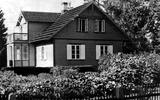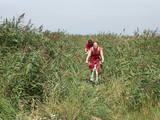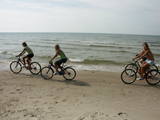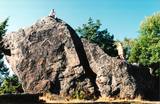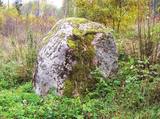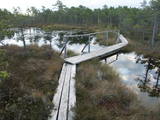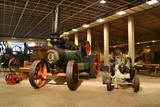| Nr | Nosaukums | Apraksts |
|---|---|---|
|
Viļņotu pauguru virkne, kas veidojusies Litorīnas jūras laikā, vējiem sapūšot augstu kāpu valni. Skaists skats uz Liliju ezeru. Iepretim ezeram, minētā ceļa austrumu pusē, pa dolomīta kāpnēm nokļūstam līdz piemineklim, kas veltīts 90 latviešu strēlniekiem, kas krituši 1917.gada kaujās.
|
||
|
Saimniecības pirmsākumi meklējami 1992. gadā. Produkcijas gatavošanā tiek izmantots pašu audzētās govs piens. Piedāvā ekskursiju pa saimniecību, produkcijas degustāciju un iegādi. Var pasūtīt sierus. |
||
|
Ezeres kultūrvēstures un novadpētniecības materiālu krātuve “Muitas nams” ir izveidota vēsturiski nozīmīgā ēkā, kur, II pasaules kara noslēgumam tuvojoties, 1945. gada 8. maijā tika parakstīts Kurzemes katlā ielenkto vācu karaspēka daļu kapitulācijas akts. Ar to tiek uzskatīts, ka Ezerē faktiski beidzies II pasaules karš. Krātuves materiālu ekspozīcijas ir no Ezeres pagasta senvēstures līdz šodienai, tai skaitā ezernieku vaļasprieki. |
||
|
Pirmā latviešu romāna “Mērnieku laiki” līdzautors Reinis Kaudzīte Pēterupes ciemā uzturējās kopš 1913. gada. |
||
|
Seklais un aizaugošais (aizaugums ap 40 %) Liepājas ezers ir viens no nozīmīgākajiem Baltijas jūras piekrastes ligzdojošo un migrējošo putnu (atpūtas, barošanās vieta) ezeriem, kurā konstatētas > 100 putnu sugas. Tas ir arī ne mazāk nozīmīga daudzu iesāļiem biotopiem raksturīgu augu sugu dzīves vieta. Liepājas ezera ziemeļaustrumu krastā – Vītiņu pļavās palieņu pļavu apsaimniekošanas nolūkos ir izlaisti dzīvei savvaļā pielāgotie mājlopi, izveidots skatu tornis, kas pieejams iepriekš piesakoties gida pavadībā. Interesantus skatu punktus un ainavas, kā arī ceļojuma iespaidus var gūt, izstaigājot vai ar velosipēdu izbraukājot (ekstrēmi, sevišķi vasarā!) dambju sistēmu, kas atrodas ezera dienvidrietumu daļā. Ezera apkārtnē atrodas unikālās Liepājas fortifikācijas sistēmas atliekas. |
||
|
Aizsargājamā jūras teritorija „Nida - Pērkone” ir viena no bioloģiski daudzveidīgākajām un dabas aizsardzībai nozīmīgākajām jūras teritorijām Baltijas jūras atklātās daļas piekrastē – šeit atrodamas izcilākās rifu teritorijas. Migrācijas laikā teritoriju šķērso vairums Latvijā sastopamo migrējošo putnu sugu. Teritorija īpaši nozīmīga lielās gauras un mazā ķīra aizsardzībai. Tā atrodas iepretim Rucavas un Nīcas novadam, platība - 36 703 ha. Teritorija daļēji pārklājas ar dabas parka „Pape” jūras daļu un ietver dabas parka „Bernāti” jūras daļu.
|
||
|
0,2 km austrumos no Vidsmuižas atrodas no šķeltajiem laukakmeņiem un sarkanajiem ķieģeļiem celtā (1910. - 1912. g.) Vidsmuižas katoļu baznīca. Tāpat kā Riebiņos esošā, arī šī ir uzskatāma par tipisku 19. – 20. gs. mijas Latgales lauku baznīcas paraugu. |
||
|
Neticami! Tā saka tie, kuri Ziemeļigaunijas dižāko akmeņu apzināšanu ir sākuši ar šo ledāja atnesto gigantu! Jāņa – Toma akmens kopā ar vēl diviem milžiem - Tammispeas akmeni (Tammispea kivi) un Ehalkivi (atrodas netālu no Kundas) pretendē uz Baltijas augstāko dižakmeņu (augstums sasniedz gandrīz 8 m) godu! Kaut arī pēc tilpuma (274 m3) tas ierindojas tikai Igaunijas lielāko akmeņu saraksta 14. vietā, arī pārējie izmēri (garums: 13,9, platums – 7,3 m, apkārtmērs – 35 m) ir gana iespaidīgi. Jāņa – Toma akmens ir meklējams Kasispeas (Kasispea) ciemā, neliela kadiķu lauka malā. |
||
|
Ubagovas velnakmens. Tā ir kulta vieta un atrodas Ubagovas ciema
dienvidu galā 130 m uz Z, ZR no ciema kapsētas, ceļa malā. Vietējie
iedzīvotāji to sauc par „Čorta kameņu” un stāsta, ka te spokojoties, ja
cilvēks ejot viens, tad viņu noteikti ievilinot mežā. Akmens ap 1,6 m
augsts. Tā virsma gluda, bez jebkādiem iecirtumiem.
|
||
|
Gatavo sierus, izmantojot vecas, Latvijā pielietotas receptes. Kā simts un vairāk gadus atpakaļ, sieri tiek taisīti ar rokām. Produktiem ir piešķirta „Zaļā karotīte”. Svaigo sieru var kūpināt. Organizē ekskursijas, kuru laikā var iepazīt uzņēmumu. Pieņem pasūtījumus un piegādā gatavo produkciju. |
||
|
Krimuldas muiža pirmoreiz rakstos ir minēta jau 15. gs. Tagad redzamā Krimuldas pils lepni slejas Gaujas senlejas labā pamatkrasta nogāzē iepretim Siguldas Gaisa tramvajam. Gan uz pili (no pretējā krasta un no Gaisa tramvaja), gan no pils paveras lielisks Gaujas senlejas skats. Krimuldas pili būvēja 19. gs. neoklasicisma stilā un tās īpašnieks bija firsts Līvens. 20. gs. 20 gados pēc pils atsavināšanas tā nonāca Latvijas Sarkanā Krusta īpašumā, kas izveidoja bērnu sanatoriju. Mūsdienās muižas pilī atrodas rehabilitācijas slimnīca "Krimulda", bet no saimniecības ēkām ir saglabājušies muižas staļļi, kūts, kalpu, pārvaldnieka un t.s. Šveices māja. Krimuldas muižas apskates nolūkos tiek organizētas izglītojošas ekskursijas, piedāvā naktsmītnes. |
||
|
Restorāns piedāvā garšīgus ēdienus, gatavotus no vietējo zemnieku labumiem, nepiespiestā atmosfērā. Ēdienkarte ir bagāta ne tikai ar gaļas un zivju ēdieniem, bet arī ar plašu veģetāro ēdienu klāstu. |
||
|
Teiču dabas rezervāts ir dibināts 1982. g. viena no Baltijas lielākā sūnu purvu kompleksa – Teiču purva un Pelečāres purva, to augu un dzīvnieku valsts, kā arī purvam pieguļošo teritoriju aizsardzībai. Teiču purvā vairākām putnu sugām, piemēram, pelēkai dzērvei, lietuvainim, dzeltenajam tārtiņam un purva tilbītei ir Latvijā lielākās ligzdojošās populācijas, bet migrāciju laikā apkārtnē koncentrējas vairāki tūkstoši dažādu sugu zosis. Rezervāta apskate iespējama vienīgi rezervāta administrācijas gida vai reindžera pavadībā, iepriekš savlaicīgi piesakoties. Apmeklētāji var iepazīties ar Sildu ezera laipu taku un Siksalu ar vienu no labākajām Latvijas purvu ainavām, kas paveras no skatu torņa. |
||
|
Ja jums patīk aktīvs dzīvesveids, šī ekskursija ir ideāls veids, kā izbaudīt kulināro mantojumu, kas slēpjas Gaujas Nacionālajā parkā. Velomaršruts sākas no Strenčiem un vispirms ved caur divām vietējām alus darītavām Brenguļos un Valmiermuižā ar jaukām kafejnīcām un labu alu. Ceļā uz Valmieru apstāsieties arī Trikātas ciematā, lai nobaudītu vietēji gatavoto šokolādi. No Valmieras maršruts ved cauri skaistam mežam uz Cēsīm un tur esošo burvīgo viduslaiku vecpilsētu. Cēsīs apmeklēsiet vietējo maiznīcu un spirta rūpnīcu, lai nobaudītu produkciju. Jūs redzēsiet arī to, kā viduslaikos izskatījās ārstniecības un garšaugu dārzs. Brauksiet ar kanoe no Cēsīm uz Līgatni, kas ir viena no Gaujas skaistākajām vietām ar tās smilšakmens krastiem, attālām lauku viensētām un vecmodīgu ūdensdarbināmu prāmi. Līgatnes pilsētas vēsturiskais centrs ir saistīts ar tās papīrfabrikas attīstību. Šeit iespējams apmeklēt arī vietējos vīna un rokdarbu ražotājus vienā no apgabalam raksturīgajām mākslīgajām alām. Pārvietojoties pa kalnainajiem, līkumotajiem Siguldas ceļiem, redzēsiet Turaidas un Siguldas viduslaiku pilis, Gūtmaņala alu un citus gleznainus skatus. Siguldā baudīsiet latviešu tradicionālos ēdienus restorānos “Bucefāls”, “Aparjods” un viesu namā “Mauriņi” nobaudīsiet 80 ievārījumu veidus. |
||
|
Skuķu un netāli esošais Dvietes ezeri ir vieni no teritorijas grūti pieejamajiem palieņu ezeriem – lielākie šāda tipa
ezeri Latvijā. Palu laikā pārplūst, savienojoties vienā lielā ūdenskrātuvē.
|
||
|
Akmensraga tāpat kā Kolkasraga apkaime jau kopš seniem laikiem ir bijusi zināma kā kuģotājiem bīstama vieta, jo te atrodas viena no lielākajām Latvijas piekrastes kuģu kapsētām. Bīstamības fakts slēpjas apstāklī, ka Akmensraga apkārtnē mainās krasta virziens un jūrā iestiepjas akmeņaini sēkļi. Pirmo signāluguni Akmensragā iededza 1879. g., bet 10 gadus vēlāk uzcēla 28 m augstu koka bāku. 1911. g. uzcēla mūra bāku, kuru sagrāva 1. pasaules kara laikā – 1916. g. Mūsdienās redzamā (augstums 37,5 m, uzbūvēta 1921. g.). Padomju laikā visas bākas bija militāri – stratēģiski objekti un šeit strādāja hidrogrāfiskais dienests un jūras novērošanas punkts. Bākas apkārtnē - mežā vēl joprojām redzamas bijušās padomju armijas ēku drupas. Apskatāma no iekšpuses. |
||
|
Žīguru pagasta bērnudārza telpās ir iespēja iepazīt meža dzīvi gida pavadībā. Muzeja saimnieces stāsti par mežu un meža iemītniekiem neatstās vienaldzīgu nevienu. Annas Āzes Meža muzejs — ekspozīcija, kas piedāvā apmeklētājiem mazu gabaliņu no pārsteigumiem bagātās Latvijas meža pasaules - tika atzīts par ģimenes atpūtai tīkamāko vietu Latvijā.
|
||
|
Atrodas Alsungas novada muzeja ēkā. TIC tika izveidots 2017. gadā ar mērķi veicināt Alsungas un vēsturiskā suitu novada tūrisma attīstību un nodrošināt informāciju par Alsungas novada tūrisma iespējām, veidojot pozitīvu un pievilcīgu Alsungas un vēsturiskā novada tēlu Latvijā un ārzemēs. |
||
|
Latvijas Lauksaimniecības muzejs izveidots, lai valsts iedzīvotājiem un viesiem radītu priekšstatu par Latvijas laukiem, iepazīstināt ar lauksaimniecības nozaru attīstības vēsturi un popularizēt materiālās un nemateriālās liecības par saimniekošanu un dzīvi Latvijas laukos no 19.gadsimta beigām līdz mūsdienām. Apmeklētāju interese tiek veicināta ar visdažādākajiem zemes apstrādes, kopšanas, ražas novākšanas un pārstrādes tehniku, lauku amatnieku – kalēju un galdnieku darbarīkiem, ierīcēm un izgatavojumiem, sadzīves tehniku un mājturībā vajadzīgām lietām, visdažādāko transportu, sākot ar ratiem un beidzot ar kombainu, zemes mērīšanai un meliorēšanai nepieciešamo, ģeodēzijas instrumentiem, meliorācijas aprīkojumu utml. |
||
|
Darbnīcā top brīnišķīga Latgales keramika. Apmeklētāji var noskatīties podniecībai veltītu videofilmu, kurā uzskatāmi parādīts, kā no māla pikas top trauks. Ekskursija, iespēja darboties pašiem un gatavo darbu iegāde. |
||



